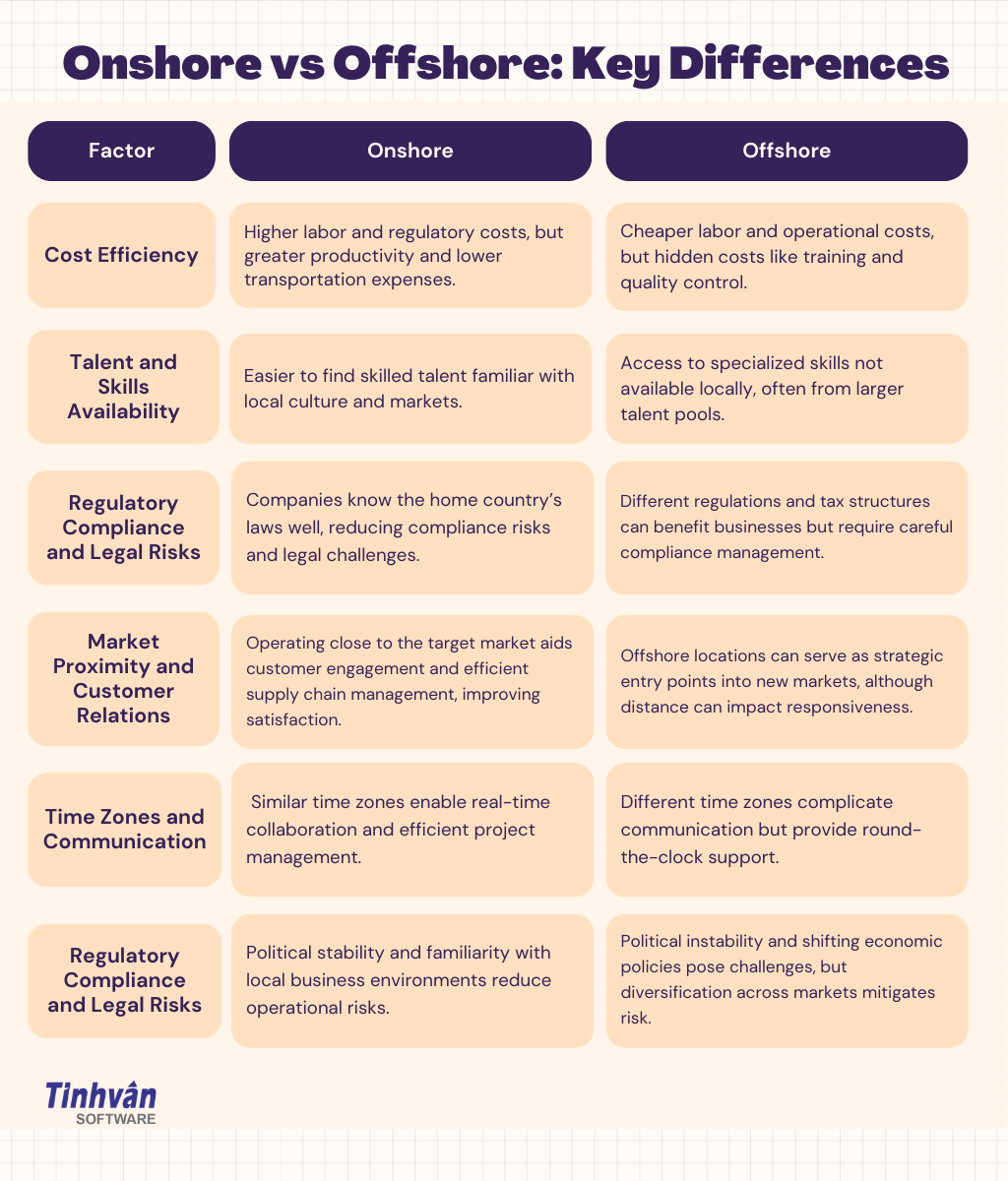
Onshore vs. Offshore: Which is the Best Choice for Business?
In today's globalized economy, companies are constantly evaluating the best strategies to remain competitive and efficient. One critical decision businesses face is whether to keep their operations onshore (within their home country) or to move certain functions offshore (to another country). This choice impacts costs, market access, regulatory compliance, and overall business agility. Here’s a comprehensive analysis to help determine the best approach.

Defining Onshore and Offshore Strategies
Onshore: Onshore refers to keeping key business processes like manufacturing, customer support, research, or development within the company’s home country. This strategy aligns with local labor standards, cultural norms, and regulatory frameworks.
Offshore: Offshore means transferring specific functions, like IT support, production, or finance, to foreign countries where operating costs are lower or specific expertise is available. Offshore locations often offer unique advantages, but there are challenges in cultural alignment, regulatory compliance, and communication.
Key Factors to Consider

Cost Efficiency
Onshore: Labor, manufacturing, and real estate costs in developed countries are generally higher. The cost of compliance with stricter local regulations further increases the overall expense. Despite higher wages, onshore operations can offer high productivity levels and significant reductions in transportation costs.
Offshore: Offshore strategies typically offer significant cost savings due to cheaper labor, lower operational costs, and tax incentives provided by many governments to attract foreign investment. However, hidden costs, such as additional training, monitoring, and quality control, need to be factored in.
Talent and Skills Availability
Onshore: In onshore locations, businesses can more easily recruit highly skilled professionals familiar with local market trends, language, and cultural context. This is particularly valuable for knowledge-intensive industries like healthcare, finance, and technology.
Offshore: Offshore locations can offer access to larger talent pools or specialized skill sets that might not be readily available domestically. For instance, many IT companies outsource technical support to countries like India or Vietnam to leverage their technical expertise.
Regulatory Compliance and Legal Risks
Onshore: Companies are generally more familiar with their home country's legal system, reducing the risk of non-compliance and regulatory infractions. There are fewer legal hurdles, as businesses are used to working within local laws.
Offshore: Different regulatory frameworks, tax structures, and labor laws may be advantageous but also pose significant compliance challenges. Understanding and navigating these complexities requires thorough due diligence.
Market Proximity and Customer Relations
Onshore: Maintaining operations close to the target market allows for real-time customer engagement, efficient supply chain management, and prompt response to market trends. This proximity often translates to better customer satisfaction.
Offshore: For businesses aiming for global expansion, having a regional presence offshore can offer a strategic foothold into new markets. However, the distance from core markets may affect responsiveness and customer relationships.
Time Zones and Communication
Onshore: When teams operate in similar time zones, synchronous communication is easier, enabling real-time collaboration and more efficient project management.
Offshore: Offshore operations across different time zones may complicate communication. However, staggered working hours can also provide 24/7 coverage, particularly for customer support services.
Risk Management
Onshore: Political stability, predictable economic policies, and familiarity with the business environment contribute to lower operational risks.
Offshore: Businesses are exposed to potential risks related to political instability, economic shifts, or changes in labor laws. However, diversification through offshore operations can reduce dependency on one market, mitigating overall business risk.
Which is Best for Your Business?
Choosing between onshore and offshore hinges on a careful assessment of the company’s strategic goals:
When to Choose Onshore:
- If real-time collaboration and high-level coordination are crucial to success.
- When customer satisfaction requires immediate responses or proximity to the market.
- If intellectual property security or regulatory compliance is paramount.
When to Choose Offshore:
- To leverage significant cost savings and access larger talent pools.
- If entering new markets requires local representation or regional expertise.
- When specialization or 24/7 support is needed for customer service.

Hybrid Approaches
Many companies adopt a hybrid approach, combining the benefits of both onshore and offshore strategies. This may involve retaining core competencies onshore while outsourcing less critical processes offshore to optimize both costs and service quality. For instance, many tech companies keep R&D in their home country while outsourcing customer support offshore.
Conclusion
In summary, the choice between onshore and offshore operations should align with a company’s specific needs, goals, and market conditions. A balanced, data-driven assessment of risks, costs, and business objectives will reveal the optimal path for a given business. Whether opting for onshore, offshore, or a hybrid model, the key is to remain adaptable in the face of changing market dynamics. Choosing Tinhvan Software for your offshoring needs means partnering with a trusted leader in IT solutions, offering a blend of extensive industry experience, a skilled talent pool, and cost-effective services. Contact us now for dedicated support.
Source: Tinhvan Software




